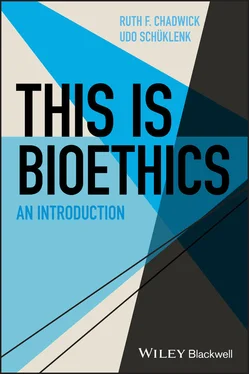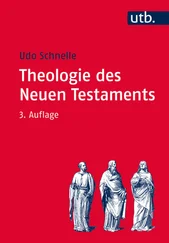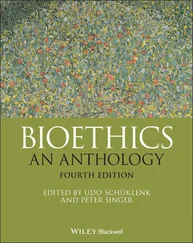3.25 Sometimes this amounts simply to giving a proposed intervention or policy a description, such as ‘that would count as eugenics’, the implication being that eugenics is something to which no right‐thinking person would subscribe (see the section on slippery slopes, below). Alternatively, someone might say ‘That would be unlawful’. But in ethics, what is unlawful is not the end of the story as we saw in Chapter 1. What the law should be is the important question.
3.26 The view that one should not ‘play God’ is commonly expressed in situations where one person or group of people is making decisions about the lives of others (such as whether they should live or die), or using new technologies that go beyond what humans have been able to do before, for example, using gene editing techniques to ‘design’ future children. When we start to look into exactly what is meant by ‘playing God’, however, we are forced to ask if there is anything to it more than mere rhetoric. Is it actually an argument at all, let alone a knockdown one? A generous interpretation, which does not dismiss it entirely, is that it is shorthand for different kinds of claims ( Gillon 1999 45 ). In the first type of case, where someone has the power to decide whether another should live or die, it expresses a point about equality, that it is wrong for someone to consider themselves to be sufficiently superior to another to take a decision about the worthwhileness of another’s life. This is at least an understandable argument, but it fails to deal with the fact that sometimes decisions about whom to save are inescapable, although it may be claimed that such decisions do not inevitably involve decisions about the value of another’s life.
3.27 In the second type of case, ‘playing God’ may be regarded as a warning about the possible adverse consequences of ‘going too far’. In this sense it is closest to what are arguably the roots of the ‘playing God’ argument, the notion of ‘ hubris 46 ’ in Greek mythology. Individuals who displayed hubris, or excessive pride, were liable to severe punishment for putting themselves on a par with the gods and trying to rise above the proper limits of human beings. Arguments about interfering with nature (see below), and opening ourselves and the planet to unforeseeable risks, express similar concerns.
3.28 In this sense the ‘playing God’ argument may reduce to a type of consequentialist argument, advising us to be aware of dangerous consequences when taking decisions in conditions of uncertainty. There are well established strategies for assessment and management of risks in such circumstances, but the fact that in dealing with new developments there are many ‘unknown unknowns’ remains for some a matter of considerable concern.
3.7 Unnatural and Abnormal
3.29 In public debates about the introduction of new technologies you will frequently come across arguments of the kind that the use of certain technologies is variously ‘unnatural’ or ‘abnormal’, and that that establishes their moral wrongness. Historically we have seen this initially not so much in the context of technologies but in the context of opposition to homosexuality. The view expressed here was that homosexuality is morally objectionable because it is seen as unnatural and/or abnormal. But what is meant by unnatural or abnormal? Homosexuality is something that occurs in nature, both human (Crooks and Baur 2014) as well as non‐human (Sommer 2006) It is something that does not violate the laws of physics, so it definitely is a natural thing. What proponents of the view that homosexuality is unnatural really mean is that in their view homosexuality violates their normative understanding of what human nature should be like. Influential thinkers as varied as the Catholic theologian Thomas Aquinas 47 (1225–1274) and enlightenment philosopher Immanuel Kant 48 (1724–1804) have tried to deliver rationales in support of such an understanding, with limited success ( Soble 2003 49 ).
3.30 Similar problems arise in arguments involving claims of abnormality. Normality describes nothing other than a statistical average. And while it is true that homosexuality is not your average expression of sexuality, it’s also true that describing that tells us nothing about the morality, or the desirability or otherwise of homosexuality. People driving Rolls Royce motorcars, flying on private jets, or those owning golden Rolex wristwatches are all abnormal, compared to the average person driving a car, flying on a plane, or owning a watch. None of that tells us anything about the morality of owning luxury cars and watches or flying on a private airplane. The reason for this is that these types of arguments commit a naturalistic fallacy.
3.31 David Hume 50 , one of the most influential philosophers of the English‐speaking world, argued in his Treatise of Human Nature (1739–1740) that it is ‘altogether inconceivable’ (and a logic error) to form or derive value judgments from facts alone. According to this view empirical premises cannot give rise to normative conclusions (Hume, T3.1.1.27). There is a great entry 51 in the Stanford Encyclopedia of Philosophy on fallacies. Henry Sidgwick also offers a good discussion of the problems surrounding ethical arguments based on ‘God’s will’, nature and abnormal in his Methods of Ethics 52 (Sidgwick 1907, Book 1, Chapter VI, §1– §2). Give these a read if time permits.
3.32 A naturalistic fallacy is committed when we deduce – always falsely – from the way how things are how they ought to be. So, when people say that reproductive human cloning or IVF – i.e. a new way of making babies – is unnatural or abnormal, and therefore wrong, they have committed such a fallacy (Pence 1998). We cannot deduce a moral ought or should from a description of something that merely is . Even if we accepted that these technologies are unnatural – and, arguably we should not even do that – it would not follow that their use is unethical. If we did agree with such a faulty line of reasoning we would quickly find ourselves in a precarious situation where, for consistency’s sake, we would have to object to the use of most human invented technologies. Radiation therapy for various cancers, or MRI scans are no more natural by that definition of naturalness.
3.33 A ubiquitous phrase used liberally in many a bioethical analysis and argument is that of human dignity. Unfortunately, while the language of human dignity is universal, there is no consensus on the moral basis or on the precise meaning of human dignity. Religious as well as secular accounts of human dignity exist, and yet, it remains unclear whether it should best be understood as a basic, or primitive, term of moral language or whether it might reasonably be derived from a moral theory of mainstream appeal. The Australian philosopher Robert Goodin thinks that it is impossible to ground human dignity in a moral theory. He suggests that we should accept ‘human dignity’ as a logical primitive, ‘a fundamental axiom in our individualistic ethical system’, as he calls it (Goodin 1981, 97). This, of course, does not resolve the problem at hand. Goodin concedes that dignity cannot be derived from an ethical framework, so, instead, he suggests without further justification, that we should accept it as a primitive term of moral language. The problem is, unfortunately, that the meaning of the term is not self‐evident to begin with and so we have no reason to accept this invitation.
3.34 Among others this was lamented by Adam Schulman, a contributor to an anthology on bioethics and human dignity produced by former US President George W. Bush’s Council on Bioethics. In his chapter Schulman analyses promising existing normative foundations for the concept of human dignity, and concludes that they all fail. Schulman takes this challenge as a kind of a conceptual call to arms: ‘In short, the march of scientific progress that now promises to give us manipulative power over human nature itself … will eventually compel us to take a stand on the meaning of human dignity, understood as the essential and inviolable core of our humanity ’ (Schulman 2008, 17). Ruth Macklin has taken a different approach. She argues in a much‐discussed article in the British Medical Journal that ‘ a close inspection […] shows that appeals to dignity are either vague restatements of other, more precise, notions or mere slogans that add nothing to an understanding of the topic’ (Macklin 2003). In her view, in secular bioethics at least, talk of human dignity merely means respect for personal autonomy.
Читать дальше












